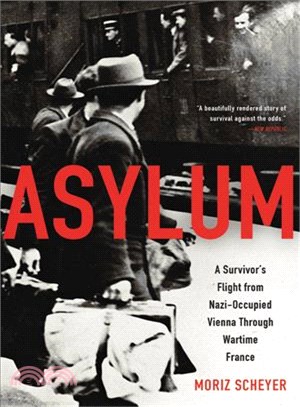目前查詢
歷史查詢

Asylum: a survivor's flight from Nazi-occupied Vienna through wartime France /
- 館藏(1)
- 書目資訊
- 心得(0)
- 機讀格式
- 標籤
書名 : Asylum: a survivor's flight from Nazi-occupied Vienna through wartime France /
紀錄類型 : 書目-語言資料,印刷品: 單行本
正題名[資料類型標示]/作者 : Asylum: a survivor's flight from Nazi-occupied Vienna through wartime France /Moriz Scheyer ; translated, with an epilogue and essay and notes, by the author's grandson, P.N. Singer.
作者 : Scheyer, Moriz,
出版者 : New York :Little Brown and Company,2016.
面頁冊數 : 305 pages :illustrations, maps, portraits ;22 cm.
內容註 : "'It may be that the way in which the words, the sentences, the pages have been put together is the result of a certain intellectual effort. But their content, their essence, has a quite different source. And that source is a profound emotional anguish. An anguish in which the wretched sufferer is able only to keep repeating the same stammering question: How could it all have happened?' As arts editor for one of Vienna's principal newspapers before the German invasionin 1938, Moriz Scheyer knew many of the city's great artists, from Stefan Zweig and Arthur Schnitzler to Bruno Walter, and was an important literary journalist in his own right. But when the vicious, brutal hands of Nazism grabbed hold of Austria, Scheyer was forced from his position and his home. In 1943, while in hiding at a convent in the Dordogne region of France, Scheyer began drafting what would become this book--his memoir. Tracing events from the Anschluss in Austriathrough life in Paris, both prewar and under German occupation, the Exodus from Paris, his experiences of a French concentration camp, an escape attempt and contact with the Resistance, and a final, dramatic rescue and clandestine life in the convent, Asylum is tense, raw, and riveting in its immediate perspective and the minute details of those terrifying, endless days. After Scheyer's death in 1949, his stepson--who disliked the book and its emotive anti-German rhetoric--destroyed the manuscript. Or thought he did. Recently a carbon copy was discovered in the family's attic by P. N. Singer, the author's step-grandson, who has translated the work and provided an epilogue."--Dust jacket.
標題 : Scheyer, Moriz,
標題 : Holocaust, Jewish (1939-1945)
ISBN : 9780316272889 (hbk.) :
LEADER 02151pam 2200121 a 4500
001 940573
005 20190426092822.0
008 190514s2016 nyua g 000 0 eng d
020 $a9780316272889 (hbk.) :$cNT$980
082 04$a940.53$222
100 1 $aScheyer, Moriz,$d1886-1949.
245 10$aAsylum: a survivor's flight from Nazi-occupied Vienna through wartime France /$cMoriz Scheyer ; translated, with an epilogue and essay and notes, by the author's grandson, P.N. Singer.
260 $aNew York :$bLittle Brown and Company,$c2016.
300 $a305 pages :$billustrations, maps, portraits ;$c22 cm.
505 0 $a"'It may be that the way in which the words, the sentences, the pages have been put together is the result of a certain intellectual effort. But their content, their essence, has a quite different source. And that source is a profound emotional anguish. An anguish in which the wretched sufferer is able only to keep repeating the same stammering question: How could it all have happened?' As arts editor for one of Vienna's principal newspapers before the German invasionin 1938, Moriz Scheyer knew many of the city's great artists, from Stefan Zweig and Arthur Schnitzler to Bruno Walter, and was an important literary journalist in his own right. But when the vicious, brutal hands of Nazism grabbed hold of Austria, Scheyer was forced from his position and his home. In 1943, while in hiding at a convent in the Dordogne region of France, Scheyer began drafting what would become this book--his memoir. Tracing events from the Anschluss in Austriathrough life in Paris, both prewar and under German occupation, the Exodus from Paris, his experiences of a French concentration camp, an escape attempt and contact with the Resistance, and a final, dramatic rescue and clandestine life in the convent, Asylum is tense, raw, and riveting in its immediate perspective and the minute details of those terrifying, endless days. After Scheyer's death in 1949, his stepson--who disliked the book and its emotive anti-German rhetoric--destroyed the manuscript. Or thought he did. Recently a carbon copy was discovered in the family's attic by P. N. Singer, the author's step-grandson, who has translated the work and provided an epilogue."--Dust jacket.
600 10$aScheyer, Moriz,$d1886-1949.
650 0$aHolocaust, Jewish (1939-1945)$vAustria$vVienna$vPersonal narratives.
650 0$aJews$vAustria$vVienna$vSocial conditions$y20th century.
650 0$aPersonal narratives.
650 0$aAutobiographies.
